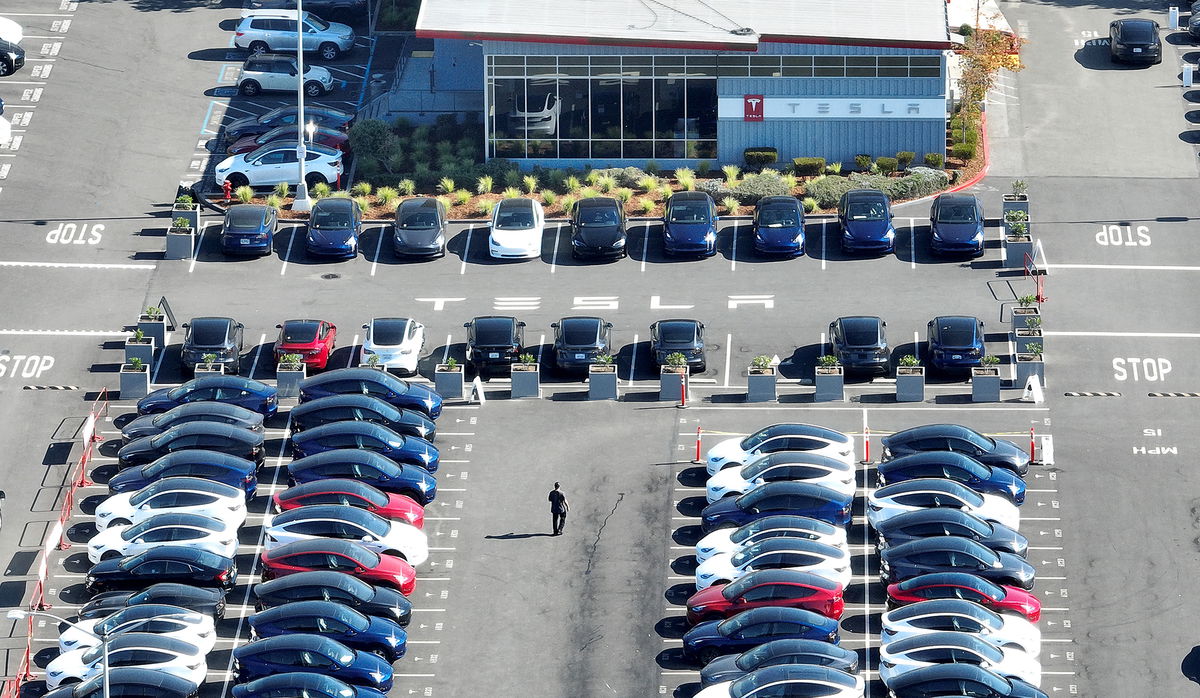Tesla reports record earnings but tighter profit margins

In an aerial view
By Chris Isidore, CNN
Tesla reported record profits for the fourth quarter and the full year, but its profit margins were tighter due to higher costs, recent price cuts, and sales in the quarter that were weaker than hoped.
The leading electric vehicle maker posted adjusted earnings of $1.19 per share in the quarter, up from 85 cents a share a year earlier, and its previous record of $1.07 a share in the first quarter. Analysts surveyed by Refinitiv had forecast EPS of $1.13.
For the full year, the company had adjusted earnings per share of $4.07, up from $2.26 in 2021.
But the closely-watched automotive gross margin fell to 25.9% from 27.9% in the third quarter and 30.6% in the fourth quarter a year ago.
Tesla gets hundreds of million dollars each year selling the governmental credits it receives for selling only zero-emission cars. Traditional automakers, which still sell primarily gasoline-powered cars, buy those credits from Tesla in order to avoid fines for not meeting strict emissions rules. Many auto analysts strip out those credits when calculating the profit margins Tesla achieves on its automotive operations.
When those credits are excluded, Tesla’s automotive gross margin fell to 24.3% in the quarter, a couple percentage points below many estimates, and down from 26.8% in the third quarter and 29.2% in the fourth quarter of 2021.
Its revenue edged past forecasts, however, rising 37% from a year earlier to $24.3 billion in the quarter. The consensus forecast was for revenue of $24.2 billion.
Tesla set a sales target 1.8 million vehicles for this year, up 37% from 2022 sales of 1.3 million vehicles. Still, that would be the company’s slowest percentage growth since 2020, when the first year of the pandemic upended sales.
CEO Elon Musk said the price cuts announced late last year and earlier this year has spurred demand for its cars and that orders are now outpacing production by a two-to-one margin.
“The most common question we’ve been getting from investors is about demand,” he said. “I want to put that concern to rest,” adding that this is the strongest January sales the company has ever seen.
“We think demand will be good despite probably a contraction in the automotive market as a whole,” Musk said. “So basically, price really matters. I think there’s just a vast number of people that want to buy a Tesla car but can’t afford it. And so these price changes really make a difference for the average consumer.”
Musk said Tesla would have capacity to make about 2 million cars this year, if everything goes smoothly. But he said he can’t count on that, especially after disruptions in recent years.
“It just always seems to be some force majeure thing that happened somewhere on Earth. And we don’t control if there’s like earthquakes, tsunamis, wars, pandemics, et cetera,” he said. “So if it’s a smooth year, actually, without some big supply chain interruption or massive problem, we actually have the potential to do 2 million cars this year. We’re not committing to that but I’m just saying that’s the potential. And I think there would be demand for that, too.”
The company’s statement and Musk acknowledged that there are economic and other uncertainties ahead that could affect 2023 results. During the call, Musk made reference several times to the risk of a recession this year, but said the company is well positioned to ride out such an economic downturn, with plenty of cash on hand. The company’s statement also referred to recession risks.
“We know that there are questions about the near-term impact of an uncertain macroeconomic environment, and in particular, with rising interest rates,” it said in the earnings statement. “We are prepared for short-term uncertainty, while being focused on the long-term potential of autonomy, electrification and energy solutions.”
Tesla shares were up more than 5% in after-hours trading after its report and conference call with investors.
Tesla’s once high-flying shares lost 65% of their value last year, the worst year ever for the company’s usually high-flying stock, in part because it failed to hit its target of a 50% growth in sales in 2022. The company’s previous aggressive growth rates and strong profit margins were factors that made Tesla the most valuable automaker in the world by far, despite having a fraction of the sales volume of other global automakers.
The automaker’s previously announced sales shortfall was attributed greatly to Covid-related shutdowns, which caused the shutdown not only its Shanghai factory, but many of its stores and suppliers in China.
Tesla also faces questions about when it will debut new products. A year ago Musk said that the company couldn’t debut long-promised new vehicles, such as the Cybertruck pickup, due to supply chain issues that forced it to concentrate on its existing product line. The company reiterated in its report Wednesday that it expects to begin production of the Cybertruck later this year. It had previously said volume production of that vehicle is expected in 2024.
Tesla also said it will reveal details of its next generation vehicle platform at an investors’ day in March.
The-CNN-Wire
™ & © 2023 Cable News Network, Inc., a Warner Bros. Discovery Company. All rights reserved.